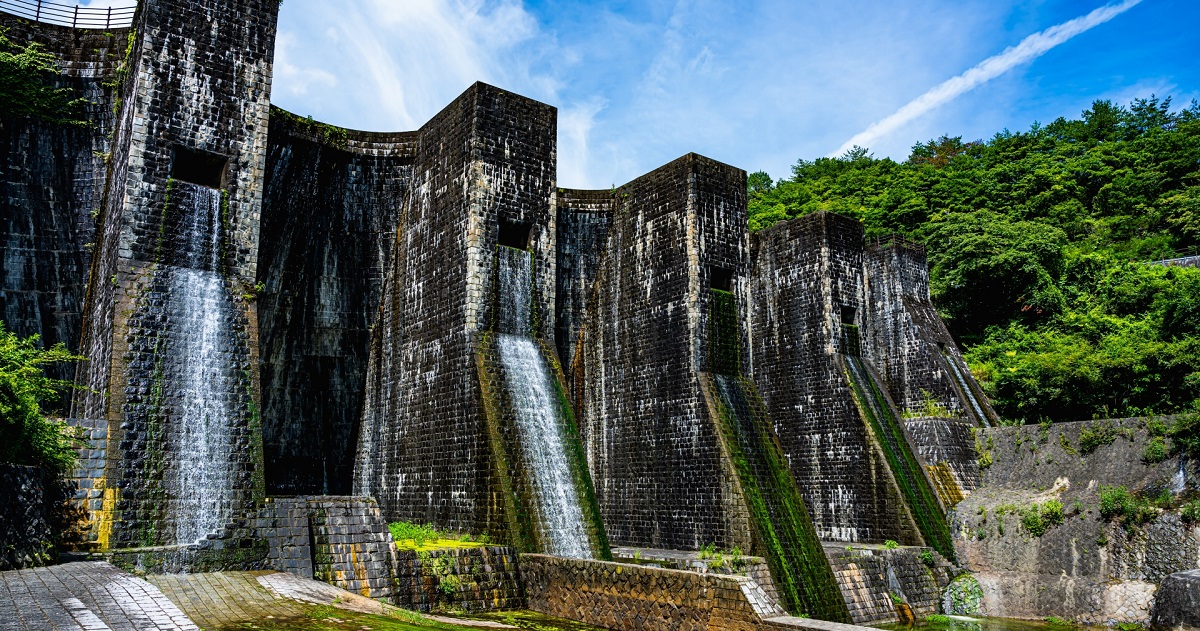Honenike Dam is Japan’s oldest masonry-type multiple arch dam located in Onohara-cho, Kanonji City, Kagawa Prefecture.
The important dams that dam up the water of the Kusuta River and moisten the paddy fields still speak to us today due to their historical background and construction technology.
Outline of Hounenike Dam
The construction of the Hounenike Dam began as an important part of measures against the severe drought.
It was extremely important for the local economy and life to irrigate the paddy fields by using the water from the Kusuda River, which flows from the Sanuki Mountains.
Construction began in 1926 and was completed in a short period of about four years with the cooperation of local residents.
The attitude of 150,000 people working together to build the dam is testament to the solidarity and effort of the region.
Technology and value of multiple arch dams
Hounenike Dam is one of the few existing multiple arch dams constructed in Japan.
A multiple arch dam is a dam that is constructed by connecting multiple arches.
The Hounenike Dam was constructed as an application of multiple arches, the latest technology developed in the United States.
Due to its technological progress and the historical background involved in its construction, it is regarded as a valuable existence in the history of civil engineering and dam technology.
アーチ止水壁が複数連なるダムのことで、多連式アーチダムとも呼ばれています。安定性は単一のアーチ式のほうが勝るようですが、川幅が広大など、単一では建設出来ない場合に用いられる形式です。
Preserving dams and turning them into cultural heritage sites
In 2006, Hounenike Dam was designated as a national important cultural property (structure).
Recognizing its position as a valuable building, the dam is being preserved and maintained.
The upstream section was reinforced with concrete during repair work, but the downstream section still retains the masonry from that time.
The Hounenike Dam is a building that beautifully demonstrates its coexistence with modern technology as well as its historical value.
Attractions around Hounenike Dam
The area around Hounenike Dam is dotted with beautiful natural environments and tourist attractions.
It is an area of Kanonji City that has many scenic views and historical sites.
When you visit the dam, please enjoy the surrounding sightseeing spots and local specialties.
You will be able to spend a rich time in a place where nature and culture are in harmony.
Basic information about “Hounenike Dam”
| Info | Houneike Dam ■Location Tanono, Ohnohara-cho, Kanonji-shi, Kagawa Prefecture ■Business hours Open 24 hours ■Inquiries Kanonji City Hall Main Building 3rd Floor Tourism Section Tel:0875-23-3933 Fax: 0875-23-3956 ■Website www.city.kanonji.kagawa.jp |
| Map | |
| Access | ■Cars/motorcycles 17 minutes by car from Takamatsu Expressway Ohnohara IC (approx. 8km) ■Railway 25 minutes by taxi from JR Kannonji Station (approx. 11km) ■Noriai bus There are 4 flights a day, and 2 buses (to Tanono) pass in front of Toyonen Pond. The remaining two flights to Ebisei diverge 1700m before Toyotoshi Pond. From JR Kannonji Station, take the Gogo Takamuro Line bus and tell the driver that you are going to Toyonen Pond. There are no bus stops on the Noriai bus, so you can hop on and off anywhere on the route. (However, getting on and off National Route 11 is prohibited except in designated areas.) |
SNS posting(#豊稔池ダム)
Find and make reservations for nearby restaurants
Find a good restaurant and have the best tour!


Comments